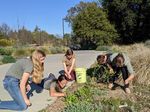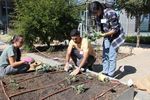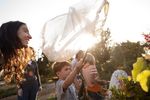Bee Campus USA - University of California Davis
←
→
Page content transcription
If your browser does not render page correctly, please read the page content below
Bee Campus USA - University of California Davis
Report on 2020
Pollinator Habitat Creation & Enhancement
The Student Farm continued creating and maintaining agricultural fields and demonstration gardens to highlight best
practices that support pollinator habitat. The Häagen-Dazs Honey Bee Haven continued to maintain and enhance the .6
acre bee garden. At the Robert Mondavi Institute for Wine and Food Science, the Good Life Garden was planted with even
more pollinator plants to enhance food production. In the Arboretum and Public Garden, volunteers, students and staff
created or enhanced pollinator habitat throughout campus. In the Arboretum collections, we maintained and enhanced
valued habitat gardens. Our Sustainable Horticulture Learning by Leading™ team designed and planted lawn conversions
and roadside sites on main campus. The SmartScape Learning by Leading™ team created a Pollinator Study Garden in
collaboration with the NSF-granted Vanette Lab. https://ccuh.ucdavis.edu/smartlandscape/pollinator-study-garden. In the
Putah Creek Riparian Reserve, several Learning by Leading™ teams conducted habitat restoration projects and planted
hedgerows that support pollinators.
Students plant drought tolerant pollinator habitat to Annal wildflowers were added to a campus meadow We expanded the hummingbird research feeders into
enhance a busy campus roadside. planting to increase and support biodiversity. the Arboretum GATEway Hummingbird Garden.Education & Outreach
The Arboretum and Public Garden hosted four “Pollinator Paradise” themed plant sales in Fall 2019. During Spring
quarter 2020, we offered programming around safely interacting with nature by using iNaturalist as a community science
tool. We opened it up to collecting all types of organisms but had a special emphasis on pollinators. iNaturalist Training for
“Naturing at Home Project” https://www.youtube.com/watch?v=G1E9G24y4bg&feature=youtu.be, Using iNaturalist for
the City Nature Challenge -- Overview, Pro Tips and More
https://www.youtube.com/watch?v=UVilgdzg2Jc&feature=youtu.be, Report on iNaturalist's "Naturing at Home" Project
https://www.youtube.com/watch?v=49Nj3XrCqJ4&feature=youtu.be. Our original Habitat Horticulture iNaturalist
project focused on observing pollinator species on plants throughout our campus to collect data on frequency and
seasonality of visitation, as well as biodiversity of visitation per plant species.
https://www.inaturalist.org/projects/habitat-horticulture-uc-davis-arboretum-and-public-garden. We also offered
pollinator-themed children's read aloud books. Bees are the Best
https://www.youtube.com/watch?v=9-DZTNx_1Bc&feature=youtu.be, If Hummingbirds Could Hum
https://www.youtube.com/watch?v=pnwnFCRhsA8&feature=youtu.be, and Señorita Mariposa
https://www.youtube.com/watch?v=uXeD_2hXczo&feature=youtu.be. The Student Farm hosted a field day Fall 2019 and
featured pollinator projects. The Häagen-Dazs Honey Bee Haven gave bee garden tours and offered hands-on educational
pollinator activities at Biodiversity Museum Day during Winter 2020. Several Departments came together for the Taste:
Wine, Art, Beer, Music event in Fall 2019. There was some educational material about the role pollinators in food and
mead production and there was a tour in the pollinator-friendly food garden.
https://rmi.ucdavis.edu/events/taste-wine-art-beer-and-music Honey and Pollination Center with SolaBee Farms hosted
Sips and Bites https://rmi.ucdavis.edu/events/sips-and-bites-hidden-world-honey . We frequently post about pollinator-
related content on the Arboretum and Public Garden social media account. We did a full week of targeted posts during
National Pollinator Week and released the pollinator Read Aloud books during that time.
Taste: Wine, Art, Beer, Music event in October 2019.
The Arboretum and Public Garden’s Habitat
Due to restrictions under COVID-19, we encouraged TASTE celebrates all things foodie against the
Horticulture Learning by Leading™ Team offered
our community to use iNaturalist as a way to enjoy backdrop of the world’s leading scientific programs
native wildflower seeds as a “Research to Retail”
nature safely while contributing to community for food and beverage research. Several tables
initiative to connect campus pollinator research to
science. mentioned the role of pollinators in the food system
community outreach.
and the food garden featured pollinator signage.Courses & Continuing Education
For-Credit: Many for-credit courses are offered that cover the role of pollinators through several lenses - ecology,
agriculture, culture and land management. These include classes like Pollination Ecology, Agrosystem Management, Wild
Davis, Apiculture, and Kids in Garden and Farm. One Animal Biology lab captures pollinator data every Fall quarter,
allowing students to develop their own plant-pollinator interaction research project with a native plant species. We offer
pollinator-related for-credit internships through the Student Farm and the Arboretum and Public Garden’s Learning by
Leading™ program (Habitat Horticulture, Sustainable Horticulture, SmartScape, GATEways Outreach, Habitat
Restoration). Continuing Education: The Arboretum and Public Garden offered its annual volunteer training that includes
pollinator and habitat gardening training. They also continued with a special Master Gardener Pollinator Garden training
group. The Honey and Pollination Center offered Master Bee Keeper Training, a Honey Sensory Course and Mead 101.
Community volunteers are trained to help steward
Students from an Animal Biology lab conduct plant- Interns learn plant identification and pollinator
the Arboretum and Public Garden collections to
pollinator interaction research on a native plant. habitat gardening strategies.
maintain healthy, sustainable landscapes.
Service-Learning
Pre-COVID, the Student Farm and the Arboretum and Public Garden hosted field days for landscape maintenance.
Students learned plant and insect identification while carrying out best management practices for weed control, IPM,
planting and maintenance. These were tied to our respective internship programs. One of our Learning by Leading™
students took on an extra project to help design a pollinator-friendly Main Street planting for neighboring Bee City USA
Woodland, CA. After restrictions are lifted and interns are allowed to return, we hope to host more of these service-
learning projects to our campus and broader community.Students learn to amend the soil, set up irrigation and Interns had the opportunity to design and create a
The UC Davis Student Farm focuses on sustainable
plant food crops in the Good Life Garden at the meadow that supports plant and pollinator
agriculture and food systems.
Robert Mondavi Institute for Wine and Food Science. biodiversity.
Educational Signage
All of our current signage is temporary, designed in house by different departments. For the Arboretum and Public
Garden, our Museum Outreach team worked with other teams to create a Bee Campus USA interpretive sign. We are in
the middle of finalizing a Bee Campus Flyer. We hope that this design can become our logo to use on signage and other
outreach material.Co-created temporary signage in the Habitat Gardens of the Arboretum and Public
Draft Flyer and Design for UC Davis Bee Campus outreach.
Garden.
Policies & Practices
Pre-COVID, we had resolved to specifically not spray in many of our gardens and planting sites, except for a select few
weed species. We are trialing a chemical application-free pollinator garden with hand pulling only. However, with the
decrease in workforce due to the effects of COVID-19, we have had to manage the weeds in some areas with herbicide
treatment to stay on top of the invasion. We do not spray neonicotinoids in our public landscapes. We follow the
University of California IPM plan: http://ipm.ucanr.edu/. When our grounds staff team regroups after the pandemic, we
hope to offer training on habitat maintenance.
Integrated Pest Management Plan:
https://sarep.ucdavis.edu/sustainable-ag/ipmYou can also read



























































